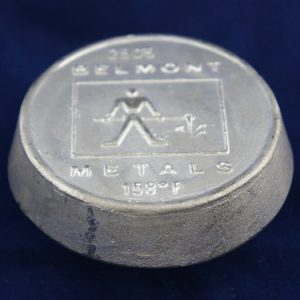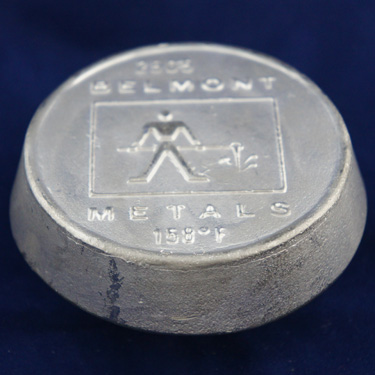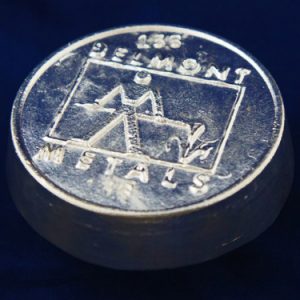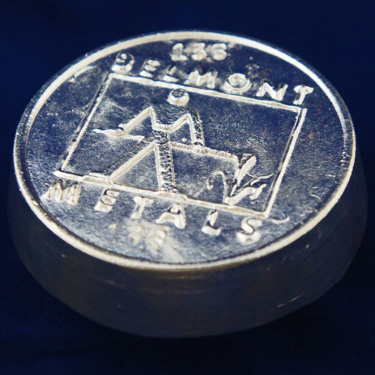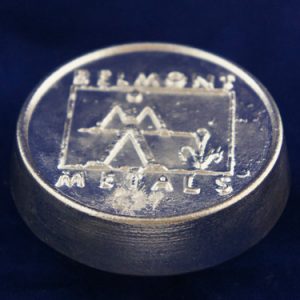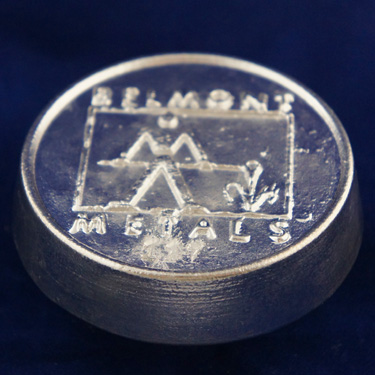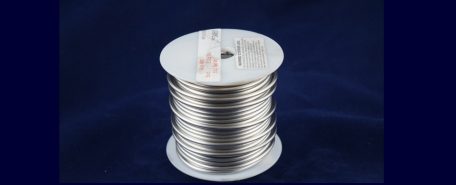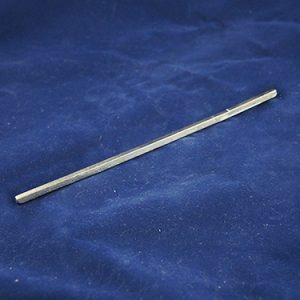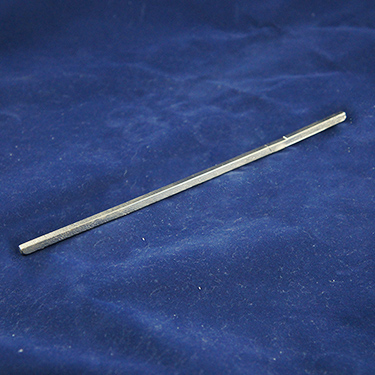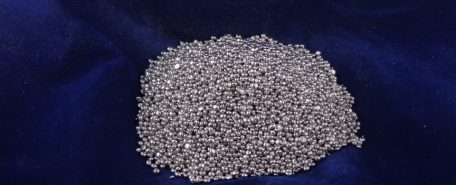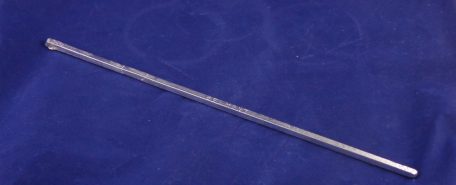This white element is an essential part of many alloys Purple-Silver, crystalline Bismuth has been in use since the early days of alloying, although during those times, it was often mistaken for Lead. It’s the most naturally diamagnetic element, which means it repels both north and south, and it has one of the lowest values…
Featuring 158°F, 203°F radiation shielding alloys, pipe bending alloys, and low temperature solders. Eutectic: melting points from 117° – 281°F.Non-eutectic: melting points from 107° – 338°F.Mellottes metal, Rose metal, Wood’s metal, and others. Low-melting alloy wire.
Low-Melting or Fusible alloys (Also known as Eutectic and Non-Eutectic Alloys) are generally the alloys that melt below 450 Deg. F. ( 233 Deg. C ). The most useful are the alloys containing high percentages of Bismuth combined with Lead, Tin, Cadmium, Indium and other metals. The low melting temperature and unique growth/shrinkage characteristics of these alloys lead to a greater diversity in useful applications than almost any other alloy system.
Applications:
From radiation therapy shielding applications to creating chucks for holding parts during machining , from being used as filler material when bending pipe or tube to creating fusible elements in automatic fire sprinklers , Low-Melting alloys continue to have a quiet yet profound impact on our lives.
Forms:
Cake, Ingot, Bar, Shot, Wire, Stick, Strip & Custom Shapes
Read More
Showing all 21 results
Featured products
-
This is a Tin based non-eutectic low melting alloy . The principle uses of this alloy are in applications similar to investment casting in which it substitutes for the so called " lost wax " pattern dies. It's other applications also include proof casting and sealing or soldering in low-temperature applications. Forms: - Cakes
- Slug
Belmont Product Code 2405 Nominal Composition: - 40% Bi
- 60% Sn
Technical Info: - Melting Point - Solidus 281 F, 138 C
- Melting Point - Liquidus 338 F, 170 C
- Short-Term Tensile Strength lbs/sq.in. 8000
- Yield Temperature 302
- Weight lbs/cu.in 0.296
- Brinnell Hardness No. (500 kg) 22
- Growth/Shrinkage - Time after Casting: after 2 mi.: -0.0001
- after 1 hour: -0.0001
- after 24 hrs: -0.0001
- after 500 hrs: -0.0001
-
This is a Bismuth based non-eutectic alloy used originally for making punch dies. It is now also used to make a wide variety of plates, chuck jaws and other holding devices for machine shops and manufacturing operations. Forms: - Cakes
Belmont Product Code 2481 Nominal Composition: - 48% Bi
- 28.5% Pb
- 14.5% Sn
- 9% Sb
Technical Info: - Melting Point - Solidus 218 F, 103 C
- Melting Point - Liquidus 440 F, 227 C
- Short-Term Tensile Strength lbs/sq.in. 13000
- Yield Temperature 240
- Weight lbs/cu.in 0.343
- Brinnell Hardness No. (500 kg) 19
- Growth/Shrinkage - Time after Casting: after 2 mi.: 0.0008
- after 1 hour: 0.0048
- after 24 hrs: 0.0051
- after 500 hrs: 0.0061
-
This is a Bismuth based non-eutectic alloy which has unique properties of shrinking immediately upon solidification and growing back to zero in 1 hour, followed by additional growth. This shrinkage-growth makes it an ideal alloy for proof casting and precision measurement of internal dimensions. Forms: - 2 lb Cakes
Belmont Product Code 2431 Nominal Composition: - 42.5% Bi
- 37.7% Pb
- 11.3% Sn
- 8.5% Cd
Technical Info: - Melting Point - Solidus 160 F, 71 C
- Melting Point - Liquidus 190 F, 88 C
- Short-Term Tensile Strength lbs/sq.in. 5400
- Yield Temperature 162.5
- Weight lbs/cu.in 0.341
- Brinnell Hardness No. (500 kg) 9
- Growth/Shrinkage - Time after Casting: after 2 mi.: -0.0004
- after 1 hour: 0
- after 24 hrs: 0.0022
- after 500 hrs: 0.0025
-
This is a Bismuth based eutectic alloy which finds uses in shielding during medical radiation treatments and is also a cadmium-free solution for radiation therapy. This material also has a rapid growth of up to .0061 after casting. It has also been used as anchoring material and for designing fusible links. Forms: - Cakes
- 1/8", 1/32" Dia. Solid Wire
- Irregular Shot
- Pigs
Belmont Product Code 2531 Nominal Composition: - 52.5% Bi
- 32% Pb
- 15.5% Sn
Technical Info: - Melting Point - Solidus 203 F, 95 C
- Melting Point - Liquidus 203 F, 95 C
- Short-Term Tensile Strength lbs/sq.in. 6100
- Yield Temperature 203
- Weight lbs/cu.in 0.35
- Brinnell Hardness No. (500 kg) 9
- Growth/Shrinkage - Time after Casting: after 2 mi.: -0.0002
- after 1 hour: 0.0055
- after 24 hrs: 0.0057
- after 500 hrs: 0.0061
-
Named after its inventor, Simon Quellen Field, Field's metal is Eutectic at 144 F, 62 C. Field's metal is expensive due to the price of indium, which makes up over half its mass. However, as it contains neither lead nor cadmium, it is a less toxic alternative to Wood's metal. It is used for die casting and rapid prototyping. Forms: - Approximately 2 lb Cakes
Belmont Product Code 2330 Nominal Composition: - Bi: 32.5%
- Sn: 16.5%
- In: 51%
-
This is Bismuth based non-eutectic alloy which does not contract upon cooling. It is mainly used as a solder but also as a heat transfer medium. Another application for this material is to serve as a valve element in automatic fire sprinklers. The valve, having a low melting point, melts in fire and provides water to stop the fire from spreading. Forms: - 2 lb Cakes Even Weight
- 1/8" x 18" Cast Strips
- 1/16", 1/32" Dia. Solid Wire
- Approx. 1/2" x 6" x 12" Broken Slabs
Belmont Product Code 2503 Nominal Composition: - 50% Bi
- 25% Pb
- 25% Sn
Technical Info: - Melting Point - Solidus 203 F, 95 C
- Melting Point - Liquidus 239 F, 115 C
- Short-Term Tensile Strength lbs/sq.in. 6200
- Yield Temperature 203
- Weight lbs/cu.in 0.3365
- Brinnell Hardness No. (500 kg) 9.5
- Growth/Shrinkage - Time after Casting: after 2 mi.: -0.0001
- after 1 hour: 0.0045
- after 24 hrs: 0.0052
- after 500 hrs: 0.006

